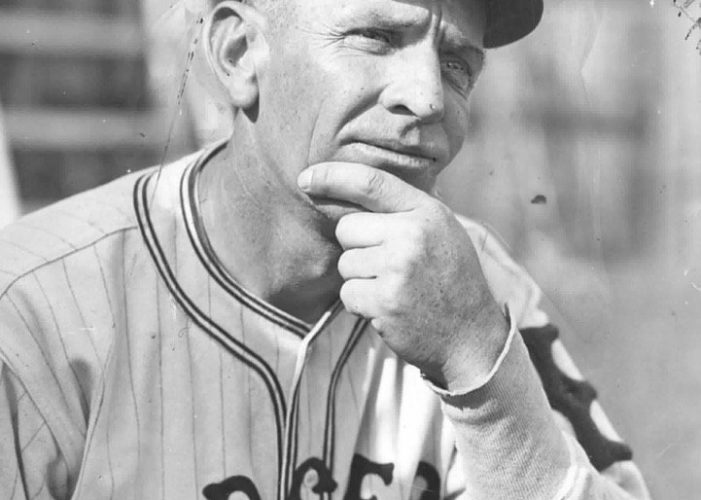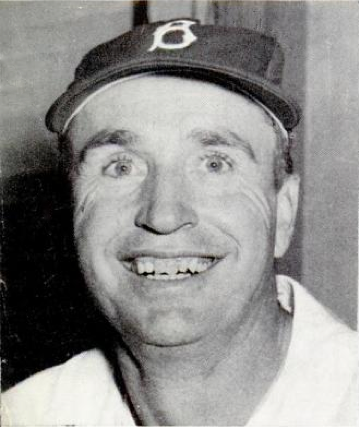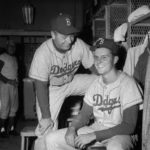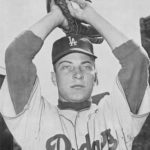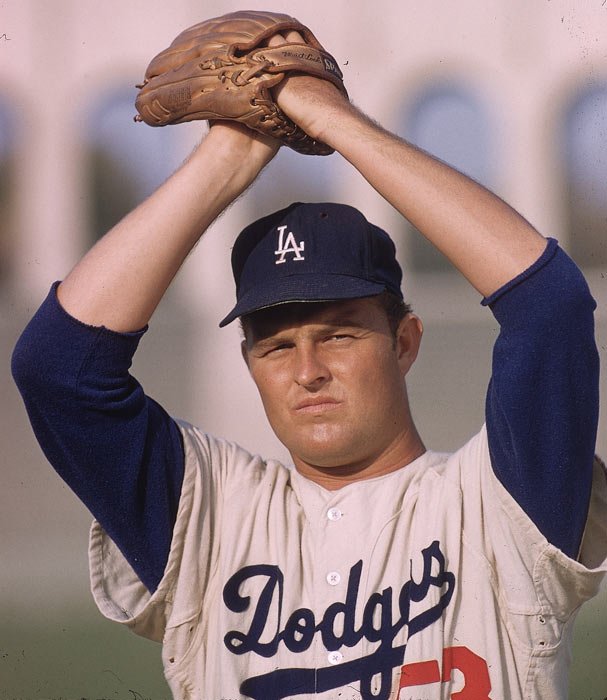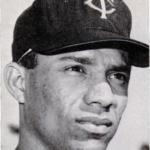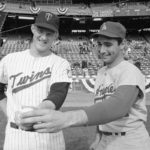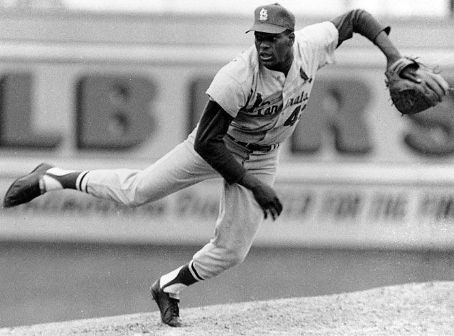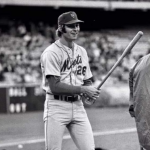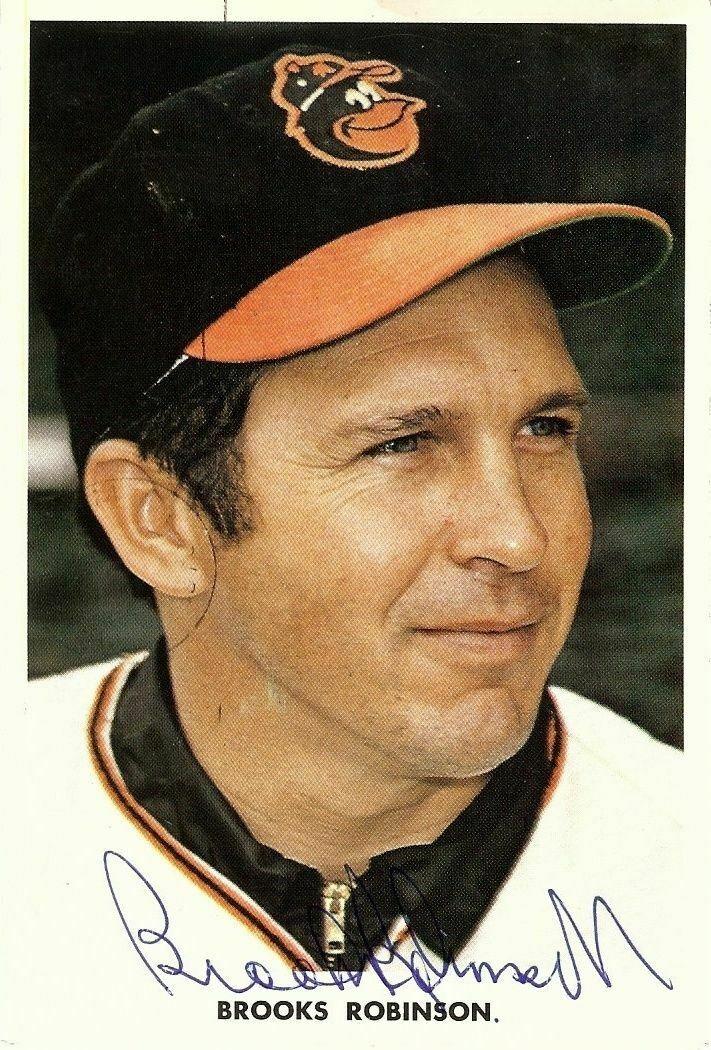Walter Alston
Position: First Baseman
Bats: Right • Throws: Right
6-2, 195lb (188cm, 88kg)
Born: December 1, 1911 in Venice, OH
Died: October 1, 1984 in Oxford, OH
Buried: Darrtown Cemetery, Darrtown, OH
High School: Darrtown HS (Darrtown, OH)
School: Miami University of Ohio (Oxford, OH)
Debut: September 27, 1936 (8,066th in major league history)
vs. CHC 1 AB, 0 H, 0 HR, 0 RBI, 0 SB
Last Game: September 27, 1936
vs. CHC 1 AB, 0 H, 0 HR, 0 RBI, 0 SB
Hall of Fame: Inducted as Manager in 1983. (Voted by Veteran’s Committee)
Full Name: Walter Emmons Alston
Nicknames: Smokey
Nine Players Who Debuted in 1936
Johnny Mize
Joe DiMaggio
Bill Nicholson
Eddie Joost
George McQuinn
Jeff Heath
Bob Feller
Nels Potter
Birdie Tebbetts
All-Time Teammate Team
Coming Soon
Notable Events and Chronology
Biography
Walter Alston survived the tough business of baseball despite his jovial demeanor and calm attitude. He was never given anything more than a one-year contract by Dodger ownership, which seemed like harsh treatment considering the fact that he led the franchise to World Series titles in both Brooklyn and Los Angeles. Behind his quiet exterior, Alston hid a fiery competitive spirit, and he is one of a handful of managers to win more than 2,000 games. He helped establish “the Dodger Way”, which translated into winning seasons in 19 of 23 seasons from 1954 to 1976.
Best Season: 1963
Many would select the 1955 Brooklyn team, which won the only modern championship in that city, but they were really no different or better than many other Brooklyn teams. The ’63 Dodgers were the best pitching team in baseball, played great defense and “small-ball.” Koufax (25-5, 1.88) and Drysdale (19-17, 2.63) were the workhorses on the hill, with Johnny Podres (14 wins) and Bob Miller (10 wins, 2.89 ERA) rounding out the rotation. Ron Perranoski provided bullpen support (21 saves, 1.67). Maury Wills led the offensive attack from the leadoff spot, pilfering 40 bases and batting .302. The rest of the lineup was solid but unspectacular, with the exception of center fielder Tommy Davis (.326) and right fielder Frank Howard (28 homers). The key word on offense was balance: two switch-hitters, three lefties and three righties played regularly. The Dodgers outperformed their pythagorean projection by seven games and then swept the Yankees in the World Series, allowing just four runs to the Bombers.
Full Bio
When Brooklyn owner Walter O’Malley hired Alston to be his manager in November, 1953, a sportswriter quipped, “The Dodgers do not need a manager, and that is why they got Alston.” Despite a cold reception, Brooklyn warmed to Alston, who guided the team to their only World Series title in the burrough. Later, in Los Angeles, Alston added two more championships.
Walter Emmons Alston was born in Venice, Ohio, on the frist day of December, 1911, the son of a farmer who had once played semipro ball. Walter played baseball at Darrtown High School, where his speedy fastball earned him the nickname “Smokey.” After high school, the lanky Alston attended Miami (Ohio) University, where he majored in industrial arts and physical education. He graduated from Miami in 1935, after starring on their baseball and basketball squads. With his parents earning a modest income during the Great Depression, Alston relied on his wits to meet his college tuition. He played pool in local taverns and pool halls, winning money to pay for his classes and books.
Alston signed with the St. Louis Cardinals after graduation and spent 13 years in the minor leagues, earning his one major league chance at the end of the 1936 campaign, after he led the Mid-Atlantic League with 35 home runs. On September 27, 1936, after Cardinals’ star first baseman Johnny Mize was ejected from the game, Alston was put in the lineup by manager Frankie Frisch. Alston was nervous in three innings he made an error and struck out in his only at-bat. The next spring, he was back in the Cardinals minor league system, blocked at first base by Johnny Mize and other prospects.
In 1940, Alston’s fortunes changed forever when he was offered the chance to play and manage at Portsmouth in the Mid-Atlantic League. That year he led the loop with 28 homers, but the team could only manage a sixth place finish. The next two seasons, in 1941 and 1942, serving as player/manager, Alston led the Mid-Atlantic homers and RBI both years, earning a promotion to Rochester, where he surrendered his managerial cap and performed as a player only. In 1944, the Cardinals released Alston, but Branch Rickey, formerly the Cardinals GM and now the president of Brooklyn Dodgers, hired Alston to play and manage in the Dodgers’ system. With the Dodgers, Alston guided St. Paul to the Junior World Series championship in 1949, and the next year found him in Montreal Brooklyn’s top farm club.
The quiet, unflappable Alston spent four seasons in Montreal, grooming several Brooklyn stars for the big club. When the Dodgers’ managerial position was open after the ’53 campaign, O’Malley surprised the press and fans by hiring Alston, who was not highly regarded by most experts outside of the Brooklyn system.
Since his predecessor, Charlie Dressen, had been axed because he demanded a multi-year contract, Alston made sure to never balk at his one-year deals. He worked under that arrangement for 23 seasons, never knowing if he might be sent packing following the season. But his success quickly gave him comfort, as he won a World Series title in his second season, fulfilling Brooklyn’s fans’ dream.
Building a winning machine, Alston paced the Dodgers to 88 or more wins in 13 of his 23 years at the helm. He suffered just four losing seasons, and posted a career .558 percentage. Alston won World Series titles in ’55, 1959, 1963, and 1965, relying on power and pitching in the 1950s, pitching and speed in the 1960s, and youth and pitching in the 1970s, when he won his final pennant, in 1974. He was named Manager of the Year six times, and garnered a record seven wins as manager of the NL All-Star squad.
Future Managers who Played for Alston
Tommy Lasorda, Bill Russell, Bobby Valentine, Dusty Baker, Davey Lopes, Maury Wills, Jeff Torborg, Don Zimmer, Jim Lefebvre, Phil Regan, Frank Howard, Gil Hodges, Norm Sherry, Bob Lillis, Roger Craig, Bob Kennedy, Charlie Manuel, Dick Williams
Major League Debut
September 27, 1936 … After Cardinals’ star first baseman Johnny Mize was ejected from the game, Alston was put in the lineup by manager Frankie Frisch. Alston was nervous � in three innings he made an error and struck out in his only at-bat. The next spring, he was back in the Cardinals minor league system, blocked at first base by Johnny Mize and other prospects. This was Alston’s only appearance as a big league player.
Nicknames
Smokey
Uniform Numbers
#21 (1936), #24 (1958-1976)
Milestones
Alston won his 2,000th game on July 17, 1976, at Dodger Stadium, against the Chicago Cubs. Coming back from a first-inning 4-0 deficit, the Dodgers won on a two-run single by pitcher Rick Rhoden in the fourth inning. Alston became the sixth manager to win 2,000 games.
Notes
In 1957, Alston used 100 different lineups as the Dodgers failed to repeat as National League champions.
Replaced
Chuck Dressen, who lost the famous 1951 Playoff, and lost the World Series to the Yankees in 1952 and 1953. Dressen then had the audacity to ask for a multi-year deal, and Walter O’Malley axed him.
Replaced By
His coach, Tommy Lasorda, in 1977. Lasorda was in many ways the opposite of Alston. Lasorda craved the spotlight and loved to hold court with the media and Hollywood celebrities who frequented games at Dodger Stadium. He was a visible, vocal, “rah-rah” type leader, who wore his emotions on his sleeve. Lasorda managed the Dodgers through 1996, giving the organization two managers in 42 seasons. Since the 1997 season, the Dodgers have had four different managers.
Best Strength as a Player
Loyalty, both to his players and the organization.
Largest Weakness as a Player
On occasion, such as in his reluctance to make Maury Wills an everyday player, Alston was blinded by loyalty to his veteran players.
@ET-DC@eyJkeW5hbWljIjp0cnVlLCJjb250ZW50IjoicG9zdF90YWdzIiwic2V0dGluZ3MiOnsiYmVmb3JlIjoiTGVhcm4gTW9yZSBhYm91dCB0aGUgdGVhbXMsIHBsYXllcnMsIGJhbGwgcGFya3MgYW5kIGV2ZW50cyB0aGF0IGhhcHBlbmVkIG9uIHRoaXMgZGF0ZSBpbiBoaXN0b3J5IC0gLSAtIC0gLSAtIC0gIiwiYWZ0ZXIiOiIiLCJsaW5rX3RvX3Rlcm1fcGFnZSI6Im9uIiwic2VwYXJhdG9yIjoiIHwgIiwiY2F0ZWdvcnlfdHlwZSI6InBvc3RfdGFnIn19@
Factoids, Quotes, Milestones and Odd Facts
Alston carved out a Hall of Fame career as a manager of the Brooklyn and Los Angeles Dodgers. A product of the “Cradle of Coaches,” Miami (Ohio) University, Alston tried almost every position during a 13-year minor league playing career (1935-47). Initially a third baseman, he moved to first base in 1936 and led the Mid-Atlantic League with 35 homers. Promoted to St. Louis, Alston struck out in his only major league at-bat. His first managerial assignment came while he was still a player, with Portsmouth (Mid-Atlantic League) in 1940. He led the circuit in homers (28), but the club finished sixth. The following two years, Alston led the Mid-Atlantic League in homers and RBI. He moved up, as player only, to Rochester (International League), but was released in 1944. Branch Rickey, who knew Alston from his days as the Cardinal’s GM, hired him as player-manager at Trenton (Interstate League) on July 28, 1944, beginning Alston’s 33-year run as a skipper in the Dodgers’ organization. He spent two seasons at Trenton, one at Nashua, one at Pueblo, and two at St. Paul. After leading St. Paul to the Junior World Series in 1949, Alston was promoted to Brooklyn’s top minor league club, Montreal. During four seasons in Canada, guiding many of Brooklyn’s future stars, Alston’s Royals never finished below second place. Finally, on November 24, 1953, Walter O’Malley named Alston to replace Charlie Dressen, who wanted a multi-year contract, a Dodger taboo. Alston served under 23 consecutive one-year contracts. Following charismatic helmsmen like Leo Durocher, Bert Shotton, and Dressen, Alston kept a low profile in the dugout. A quiet, dignified leader, Walt refused to panic following a disappointing second-place finish in 1954. He proved he was boss in 1955, quelling clubhouse turmoil just before the start of the season. With a lineup of stars, Alston led Brooklyn to its only World Series victory in 1955 and a pennant in 1956. Alston adapted to his talent: the power-laden Brooklyn clubs, the pitching-rich Los Angeles Dodgers of the 1960s, and the young team of the 1970s. Sandy Koufax, Don Drysdale, and Maury Wills led the group that earned four pennants in eight seasons from 1959 to 1966. Steve Garvey, Dave Lopes, and Ron Cey headed Alston’s last great team. At age 62, Alston guided his 1974 Dodgers to a seventh and final World Series. He was honored as Manager of the Year six times by Associated Press and five times by United Press International. In eight All-Star Game assignments, he was the winning manager a record seven times. Alston was the first 1970s manager inducted into the Hall of Fame.
Other Resources & Links
Hall of Fame: Inducted as Manager in 1983. (Voted by Veteran’s Committee)
View Walter Alston’s Page at the Baseball Hall of Fame (plaque, photos, videos).
View Player Info from the B-R Bullpen
View Player Bio from the SABR BioProject
If you would like to add a link or add information for player pages, please contact us here.

